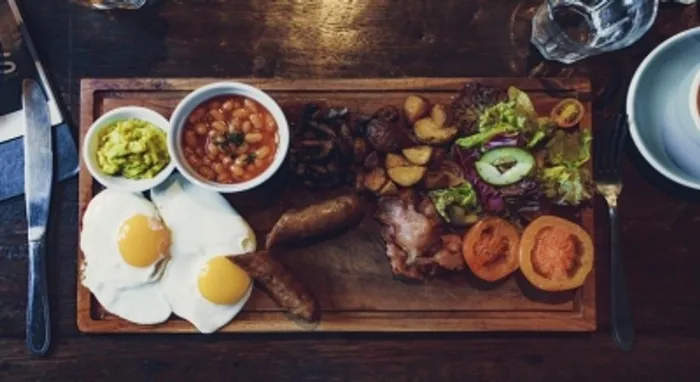Nutrition experts debunk top sports diet mistakes

Nutritionists suggest a balanced diet to support sport and fitness goals. File image
Johannesburg - A well-planned diet could enhance your sporting performance and even reduce the risk of injuries, experts insist.
And with more than six millions views on TikTok for #athletediet, there appears to be an eagerness to seek nutrition advice to support fitness goals. However, it can be hard to tell facts from the myths.
With this in mind, Live Rugby Tickets, the leading secondary marketplace for rugby tickets, collaborated with nutritionists Vanessa Peat and Caroline Hind to debunk the top misconceptions of sports diets. They revealed the truths that can boost your performance and reduce your risk of injury.
Myth 1: Eating after dinner will make you gain weight
Peat and Hind said that for those of us who snack after 6pm, there is no need to feel guilty. “There is actually no right or wrong time to eat, but instead it depends on your workout and sleep schedule.”
They explained that if you prefer going to the gym or your local grass-roots football in the evenings, eat a light meal one to two hours before you go and have some post-workout snacks afterwards.
“Eating nutritious food with protein after a workout can help you replace glycogen stores and recover muscles to reduce the risk of overuse injuries,” they said.
“This is particularly important after muscle-building activities.”
Myth 2: Carbs will make you fat
The nutritionists said that many people believe carbs are the cause of weight gain, but that may be the biggest misconception about dieting.
“Carbs are essential for a sports diet as it not only reduces your risk of injuries, but also plays a crucial role in terms of recovery.”
Research has also shown that carbohydrates fuel your body and help with muscle growth by delivering energy, controlling blood glucose, and improving metabolic functions.
“This is even more vital during a sports injury when we are more vulnerable to lose muscles and in need of glucose and energy,” Peat and Hind said.
They added that the recommended carbs during an injury are potatoes and whole grains such as bread and rice.
“But this does not mean that you should have a high-carb diet.
“Increase carbs around your sessions, but emphasise protein-rich foods with plenty of colourful vegetables the majority of the time.”
Myth 3: A vegan diet fails to support you
There is an increasing number of athletes who are adopting a vegan diet, from tennis legends such as the Williams sisters, to British racing driver Lewis Hamilton.
And the nutritionists believe that a plant-based sports diet usually contains less fat and more fibre and carbs, which helps improve blood viscosity and increase aerobic capacity.
“This allows more oxygen to reach your muscle and improves endurance, enhancing athletic performance,” Peat and Hind said.
They added that during an injury, a vegan diet provides plenty of proteins, without the inflammation effects of meat, which are supportive to muscle tissue rebuilding and recovery. They suggested tofu, soya, wheat and peas as some of the ways to get good protein from a plant-based diet.
“Anyone reducing their intake of animal-sourced foods should consider how to compensate for these bone-building nutrients,” they said.
“Supplemental protein powders, collagen, mineral and vitamin formulas can help, especially if teamed with a low-sugar, whole-food diet.”
Myth 4: Salts are bad for you
Just as athletes need more protein, salts play a significant role in a sports diet too, the nutritionists believe.
“You need more sodium if you sweat regularly as it helps maintain body fluid balance and keeps you hydrated.”
They added that losses of sodium after sports could reduce your blood volume and the amount of oxygen it takes, which adds stress to your cardiovascular system, leading to fatigue and a higher risk of injuries.
“Drinking sports drinks with sodium prepares your heart and body for physical activities and helps your body rehydrate.”
Meanwhile, research has also shown that by supplementing with sodium, performances for endurance runners were enhanced significantly.
Myth 5: All you need for recovery is protein
Peat and Hind explained that this myth comes down to the following “R’s”.
Rehydrate: Drinking a home-made rehydration drink post-exercise will allow you to replace the fluids and electrolytes lost during sweating. A home-made electrolyte drink is easy to make and inexpensive.
Refuel: Post-exercise it is important to restore your glycogen stores, which are your main fuel source, ensuring you are ready for tomorrow’s session. This can be done by eating some fruit, pasta or white rice following your session, which will give you a quick release of carbohydrates.
Rest: It is crucial to ensure that you take time to rest following your exercise session and good sleep quality is vital.
Repair: Yes, it is important to eat protein following exercise, to provide your muscles with the necessary building blocks – however, we must not forget the other three R’s.
“Beware under-fuelling – if your food intake doesn’t meet your energy needs, your sports performance and overall health will suffer. If you’re concerned with weight and body composition, watch your sugar and processed foods,” they said.
The nutritionists added that in a well-formulated sports diet, your meals should be satisfying and contain a protein-rich food, a variety of vegetables and a portion of starchy food no larger than a quarter of your plate.